Within the activities of “Protecting Islamic and Christian Cultural Heritage in Jerusalem -Palestine Legacy-“ project funded by the European Union, PalVision, The Palestinian Academic Society for the Study of International Affairs (PASSIA) and ACT organization for Conflict Resolution held the academic conference entitled “Protection, Development and Investment in Waqf in Jerusalem” at the Legacy Hotel in Jerusalem.
The conference was held over two days 1-2/11/2022, during which the speakers discussed the challenges and possibilities for using waqf, developing it and investing in it in the city of Jerusalem, especially in the sectors of housing, education, tourism and cultural heritage. The conference also shed light on legal and economic issues and presented a set of experiences and initiatives to protect endowment properties and cultural heritage in Jerusalem.
Dr. Mahdi Abdel Hadi welcomed the audience as a representative of the partner organization, emphasizing the important role and great responsibility that the three partner organizations carried to protect the Islamic and Christian endowments in Jerusalem, raise the level of general community awareness about it, and enhance the role of youth participation in dialogues and activities related to the project and arming them with the knowledge and skills required to play their role in protecting their religious, historical and civilizational heritage.
Mr. Ibrahim Lafia, Head of Cooperation at the European Union Mission in Jerusalem, spoke about the importance of the role played by the project, and the commitment of the European Union to strengthening the persistence of the Palestinians on the land of the city of Jerusalem, and to provide them with the international incubator required to defend their rights.
The first day of the conference dealt with the endowment scene in the city of Jerusalem, and the challenges and possibilities of developing the real estate endowment, with a review of case studies of community and organizational initiatives to protect the endowment and the possibilities of investing it to serve the community in both Jerusalem and the Palestinian 1948. While the second day sessions focused on reviewing digital models for documenting the cultural heritage of the city of Jerusalem, and highlighting the role of civil society in protecting, developing and investing in it, in addition to discussing the experience of investment endowment funds in the Arab and Islamic world as a new concept in the endowment economy and the possibilities of benefiting from them in the case of the occupied city of Jerusalem, in addition to reviewing the legal framework governing endowment investment and alternative mechanisms (Arbitration and mediation) as alternative practical mechanisms to reach resolutions to endowment disputes.

